- Home
- Joseph Bruchac
Brothers of the Buffalo Page 14
Brothers of the Buffalo Read online
Page 14
“Now, boys,” Waller continued, “I have had many fights with the Indians in the ten years after that Beecher fight. But never have I seen anything to equal what was done that day. I say it was the greatest fight ever fought by any soldiers of the regular army at any time. And I do say further that in all the fights we had with the Indians, we never killed as many. A year later I heard Lone Wolf, who was there, say that the Cheyennes lost four hundred killed and fatally wounded in that one charge at Beecher Island.”
“Imagine that,” Charley said under his breath. “Four hundred killed.”
Four hundred killed in one charge? That number bothered Wash and gave him pause. With only thirty-five rifles being fired at them?
“Well, we stayed on the island for three days after the fight and rescue. We buried the five men was killed. Lieutenant Beecher, Dr. Mooers, Louis Farley, and others, all with military honors. Used the funeral flag of Company H, which flag I have in my possession. Though I feel honor bound out of respect for the dead not to bring out that flag and just flaunt it around.”
Waller raised his hand, two fingers held up. “However,” he nodded, reaching into his pack. “I do also have in my possession these items to show you lads. A scalping knife and a horseshoeing knife, both that I picked up on that very battlefield.”
Putting away his pipe, the corporal held the blades out. Most stared, wide-eyed. But Wash, who was in the front row, was close enough to reach out and touch the two weapons. Neither was sharp or at all impressive to look at. The red stains on them might have been blood...or rust. They look suspiciously like any old knife a man might obtain in trade.
“Tell you what, boys,” Waller said, a look on his face that seemed to Wash more sly than generous, “I have been thinking that it is selfish of me to keep these two blades for myself. If you was to take up a collection, I might see my way to leaving one of them here in the safekeeping of your company. Just to bring you luck.”
Wash looked over at Sergeant Brown, who was looking up at the ceiling and not reaching into his pocket like most of the other men who were excitedly bringing out whatever coins they could find to drop them into the old corporal’s hat, which Josh was passing around.
When the hat reached him, Wash followed the sergeant’s lead and just nodded as it went by, despite the look Josh gave him. Charley Smith, though, eagerly dove into his own pockets to add to the considerable stack already amassed.
“My, oh my,” Charley said, coins clinking as he dropped them in one after another. “What a story! I just hope that when my time comes to face the enemy I may prove as worthy as them heroes of Beecher Island.”
The minister was just getting warmed up.
“Your Cheyenne beliefs are foolish, ignorant, and pagan. This is the one way. Otherwise, when you die, you will fall into a lake of fire and burn in it forever. The Christian way is the one way of the spirit that you must now follow.”
Everyone was listening patiently. They listened first to the white man’s excited words spoken in English. Then they listened to the calmer voice of the translator as he put those words into human language.
That lake of fire is interesting, Wolf thought. It sounds like something that would happen to Wihio.
Wolf looked over to his left. Too Tall and Too Short had just stood up. They were walking away, shaking their heads. Wolf understood their feelings. Why would anyone who had lived a good life be punished? If one shared with others and was kind to his family, why would he be set on fire forever just because he was not a Christian? It was silly.
And why, instead of giving them the food they needed, had they been gathered by their agent to listen to foolish talk? But Gray Head was still politely listening. The old peace chief’s family was just as hungry as his. He knew how nonsensical the preacher’s message was. But it was important to be polite to a guest. So Wolf stayed where he was. He kept his face impassive as the white man’s voice rose to a shout. The Cheyenne translator, though, remained calm.
“Their Jesus god is the most powerful,” the translator said. “So he says. Their Jesus god was born of a woman who never slept with a man. So he says. He did many miracles. He turned water into wine and cured bad sicknesses. So he says. Then their Jesus god died. But he came back to life.”
Out of the corner of his eye, Wolf saw Gray Head nod. It was possible their Jesus did all those great and wonderful things. In their oldest stories Sweet Medicine did things just as wonderful.
If this Jesus was so powerful, why were his enemies able so easily to kill him?
An elbow poked into Wolf’s right side. Horse Road leaned close to whisper into his ear.
“Do you think Hook Nose had better medicine than his Jesus? Could his Jesus god make himself bulletproof?”
It took an effort, but Wolf managed to not grin. Horse Road’s thoughts were much like his own. Why didn’t Jesus protect himself?
Holy men among their people and other nations of the plains knew great medicine. Such medicine could protect a man from enemies. It would work not just against spears and nails. It could also make someone invulnerable to gunfire. Of course, such medicine worked only if you followed its rules.
The white preacher went on and on, repeating himself. Wolf no longer listened. He was thinking about how one could get medicine. It could be given to you. Or you could go and seek it on your own. Spend a long time alone on a hilltop crying for a vision. Go without food or sleep for days. Then you might get a medicine that would protect you.
That was how it had been with the great man Horse Road had mentioned. Wo-oh-ki-ni, Hook Nose, was his name. He was known by everyone for his bravery. Even the white men knew him, though they called him by the strange name of Roman Nose. He was an honored member of the Crooked Lance Society. But he was never a chief or a headman of any sort. Whenever such honors were offered to him, he refused them.
The fight in which he died was not an important one. The Striped Arrow People remembered it only because it was where Hook Nose lost his life. Three villages had been set up along the Republican River. Two were Lakota villages. The third village was Cheyenne. Hook Nose was there. He was visiting friends. Just before dawn, a small party of Lakotas coming from the south saw a column of fifty white soldiers. Those Lakotas hurried back to the villages farther up the river.
“The Long Knives are coming,” they shouted as they rode through the three camps.
Criers went from lodge to lodge.
“Make ready to defend our women and children. Make ready to defend our old people.”
Boys ran out onto the prairie to drive in the horses. Men got out their paint, their weapons and coup sticks, their war regalia.
The war leaders of all three camps came together. They agreed to attack as one. This was a good plan. Things often went badly when fighting the ve’hoes when small groups of young men slipped away from the main party to be the first to strike the enemy. Such early strikes gave the white soldiers time to prepare.
It took time for everyone to get ready. Each man had to find his favorite war horse. Each man had to make sure his protective medicine was right. Properly paint himself and his horse.
The sun was in the middle of the sky when they set out to find the white soldiers. They went where the Long Knife soldiers had been seen. They were no longer there. They searched all afternoon. They found no trace of the white men. When night fell, they made camp on the prairie.
Then, in the middle of the night, eight young men went out. They did just what the Dog Soldier chiefs had forbidden. They went looking for the enemy. Near dawn, they saw the light of fires. It was the camp of the white men. They were on a long sandbar in the same river that flowed to those villages. On one side of that sandbar the channel was wide. On the other side the river was narrow and shallow. That sandbar island had been long exposed. Willows and rushes and even a few cottonwood trees grew on it. The eight young men crept close. Waving their blankets and shouting, they ran through the horse herd to stampede it. But the horses wer
e tied to picket pins. Only a few broke loose. The young men got away with seven horses.
Those young men came whooping into camp, driving the captured horses ahead of them. They were proud of what they had done. But Hook Nose shook his head.
“This is not good,” he said. “They have given our enemies time to get ready.”
He was right. By the time the main force of the people reached the white men’s camp, the soldiers had dug like moles into the sand. They had piled up their packs as breastworks. The chiefs tried to hold everyone back. They were still three miles away from the camp. It would be foolish to start the attack. But the young warriors with them were too eager. It ended up with everyone charging in a long line. By the time they reached the island, all the soldiers were shooting at them.
Most of the warriors circled around the island, splashing through the river. But one Cheyenne man, Bad Heart, had bulletproof medicine. He rode straight through the scouts and up over the island. The white men fired at him many times. No bullets struck him. When he reached the other side, he turned around and rode through the white men a second time. He still was not hit by any bullets.
Other men, though, were not bulletproof. Some white scouts were concealed in the high grass and reeds. Dry Throat was shot by them and killed. As he shook his shield over his head, White Weasel Bear was shot by those scouts. He fell off his horse and was dead. His nephew, White Thunder, who was only nineteen, rode to try to help when he saw his uncle fall. He, too, was killed.
The fight had been going on for some time when Hook Nose arrived at the battlefield. He stopped on top of a hill, a mile from the fight.
“Hook Nose has arrived,” people began to shout. The fighting stopped. Everyone stood back, waiting to see what he would do.
Several men rode up to him. He dismounted and sat with them on the side of the hill away from the fight.
“When are you going to fight?” they asked him. “You should lead the next charge.”
Hook Nose shook his head.
“Something was done the other day at the Lakota camp,” he said to them. “White Bull, who made my bulletproof medicine, told me I was told never to eat anything touched by iron. The bread I ate today was lifted with a fork. I learned that only after I ate it. My medicine will no longer work until I have it renewed. There is not enough time for that now. If I go into this fight, I will be killed.”
White Contrary rode up. He was an old man but still a good fighter. So he had ridden out with the other warriors.
“Ah,” he said. “Here is Hook Nose, the man we all depend upon, sitting behind this hill. Do you not see your men out there dying? Two fell just before I came up here. All those men feel they belong to you.”
White Contrary then made a wide circle with his hands. “All of them. They will do anything you ask. But here you sit behind this hill.”
Hook Nose stood up. “I have done something I was told not to do. My food was lifted with an iron tool. I know that I shall be killed today. Still, I will fight.”
He went back to his horse and took down the bundle with his paint and war regalia. He shook out his war bonnet and held it up and looked at it. That war bonnet was the one given him by White Bull to protect him in battle. Its medicine would work only as long as he never ate food that had been lifted with a metal tool. He carefully put the bonnet upon his head. He mounted his horse. He rode fast toward the white men, followed by many other Cheyennes and Lakotas. As he rode right past those white men hidden in the high grass and reeds, they shot him in the back. He fell from his horse. He had enough strength to crawl up to the bank, where others came and carried him away. But he died before the setting of the sun.
The fight there went on for another two days. Finally, because the white men were dug in so well, it was decided they had fought enough. Everyone left. Nine people were killed there. Six were Cheyennes, two were Lakotas, and one was Arapaho. In addition to Hook Nose, the Cheyennes who died were Prairie Bear, Dry Throat, White Thunder, Killed by a Bull, and Weasel Bear. The Arapaho was named Little Man, and he was a chief. Wolf could not remember the names of the two Lakotas.
An elbow poked Wolf again in his side.
“Brother,” Horse Road said, “are we going to sit here all afternoon?”
Wolf looked up. Only he and Horse Road were still there. All the others were gone. Wolf had been so deep in remembering the story of Hook Nose’s death that he had not noticed the white man finish his talk.
Wolf stood up. He shook his legs to bring them back to life after sitting for so long.
“Let’s walk,” he said.
Together the two of them walked to the edge of the camp. They stood side by side looking out at the prairie.
Wolf thought about what it meant to be one who protects the people. One who would face the enemy even if he knew it meant
his death.
Would I be able to do such a thing? And what would happen then to my mother and my sister without me to hunt for them and protect them?
Wolf looked over at Horse Road. His friend longed to make his own name good, to have stories told about him.
Is that all I want?
“What were you dreaming about?” Horse Road asked.
“Hook Nose.”
“Hee’he’e,” Horse Road said. “How great it would be to be made bulletproof! Would you not like such medicine, Following Wolf?”
Wolf was silent for a time. “Perhaps,” he replied. “But I would be careful who I got it from. Not everyone can make men bulletproof.”
The man with one eye
learns to thank God
when he meets a man
who is blind.
Bowing to one
who is shorter than you
does not prevent you
from standing straight again.
A man’s faults
are like a hill.
When he stands on them
he sees only those
of other people
and talks about them.
It is not the eye
that understands
but the heart
and the mind.
RAIDERS
Indians had attacked some of the settlers’ homesteads. Bad attacks. It was not just that cattle and horses were stolen. People were killed. The latest dead were a man and his wife and their two children, brutally murdered and then scalped in front of their own home.
Since arriving at Fort Griffin, the only Indians Wash had seen were their Osages and the new Tonkawa scouts. But an attack like that just had to have been Indians. Kiowas and Comanches. Or maybe Cheyennes. Renegades leaving their reservations and raiding down into Texas.
At the moment, Lieutenant Pratt was riding up front with some of those Tonkawa scouts. Like a bear in a honey tree. A big grin on his pockmarked face as he looked down his long nose at them. He nodded and they agreed and followed after him like he was Moses showing the way to the Promised Land.
It hadn’t been that way when they first arrived. The Tonkawas had been a problem. It was because of the very same thing that was the curse of so many a man and woman in the West, but especially so for the red folks: strong drink.
Whiskey was cheaper and easier to come by at Fort Griffin than clean water. As a result, on any given day half of the Tonkawas were useless as scouts or for any task other than lying about drunk as skunks. Or so it was until Lieutenant Pratt took his usual direct way of dealing with things. He called the Tonkawa chief to him.
“I have been told by our commanding officer,” Lieutenant Pratt said, “that whiskey is a problem for your people. So I have made a road for those of you who drink, and I am going to make you walk it.”
The old Tonkawa chief, not yet realizing the measure of the man he was facing, nodded his head.
“Right, Lieutenant. Whiskey no good. Whiskey bad. Me not like whiskey.”
“Your judgment is right,” Lieutenant Pratt had replied. He lifted up one long finger and drew a line in the air. “
Now listen well. Here is the road I am setting before you. The next time you are drunk, you will be placed in the guardhouse until you are sober. Then, for the next seven days you will be given a wheelbarrow and go around picking up trash. The next time it happens, you will have to do this for fourteen days. And if it happens again, twenty-eight days. Each time the punishment will be doubled. That is all. Now go back to your camp.”
Not long after, Lieutenant Pratt, Wash, and Charley were riding by the Tonkawa camp, just down off the mesa where the fort sat. From the woods they heard loud, inebriated voices. The lieutenant signaled them to tie their horses and follow the sound. There among the trees just behind the Indian camp, they saw the two drunk men who’d been fighting. One of them was the Tonkawa chief, who lay sprawled out on the ground. The second intoxicated Tonkawa, one of the tribe’s big men, stood over the chief with a rock, threatening to kill him. Lieutenant Pratt knocked the rock from the big man’s hand while Charley grabbed hold of the man. Wash tried to help the chief to stand, but he was too drunk and his weight too great for one man to lift.
“Leave him,” Pratt ordered.
A few minutes later they entered the fort, the big Tonkawa man staggering in front of Pratt, who was riding his horse close behind to prod him along.
“Sergeant Brown,” Lieutenant Pratt ordered, “you and Private Vance get a cart. Then collect the chief and bring him back up to the guardhouse, where we are taking this man.”
Although the chief was still so drunk, the sergeant and Wash managed to flop him up into the wagon bed like a sack of flour and then roll him out into the guardhouse.
The next day, when both Tonkawas were sober, Lieutenant Pratt repeated his talk about not drinking to the man who had held the rock.
“I shall not warn you again,” the lieutenant said, sending the man back to the Tonkawa camp.

 Peacemaker
Peacemaker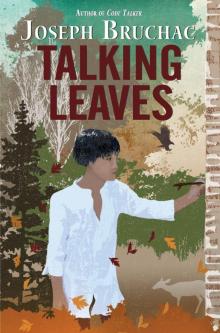 Talking Leaves
Talking Leaves Found
Found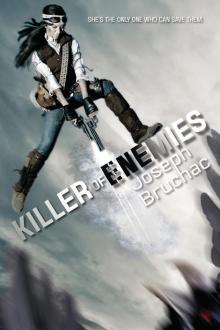 Killer of Enemies
Killer of Enemies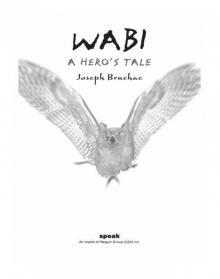 Wabi
Wabi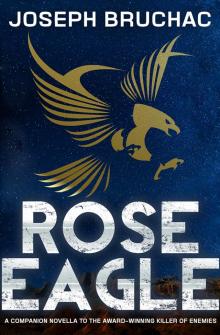 Rose Eagle
Rose Eagle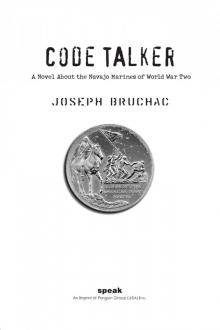 Code Talker
Code Talker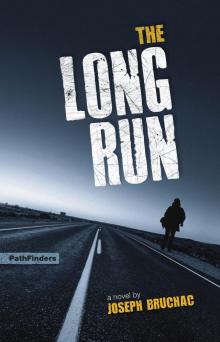 The Long Run
The Long Run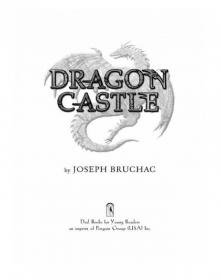 Dragon Castle
Dragon Castle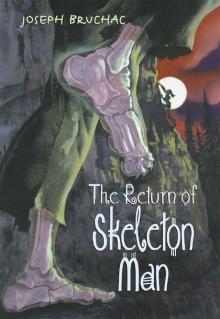 The Return of Skeleton Man
The Return of Skeleton Man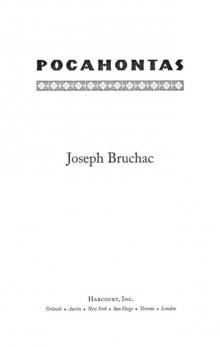 Pocahontas
Pocahontas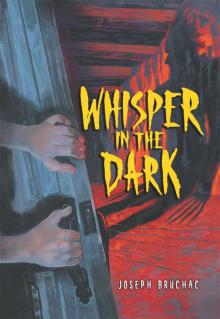 Whisper in the Dark
Whisper in the Dark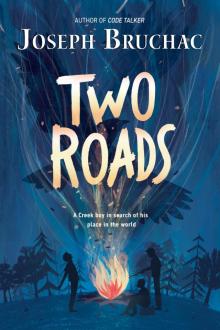 Two Roads
Two Roads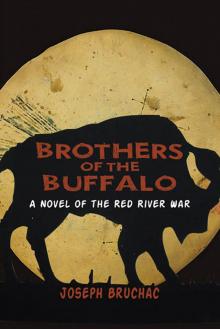 Brothers of the Buffalo
Brothers of the Buffalo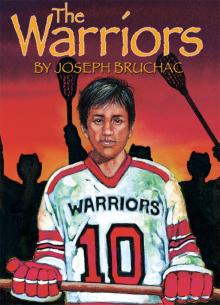 The Warriors
The Warriors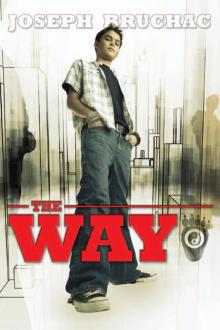 The Way
The Way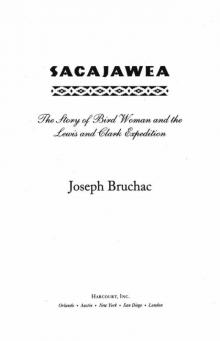 Sacajawea
Sacajawea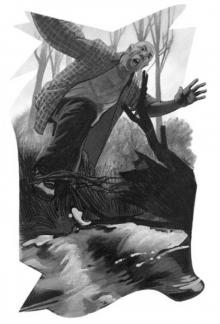 Night Wings
Night Wings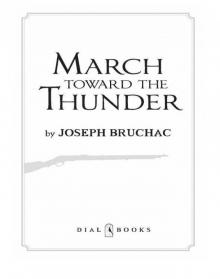 March Toward the Thunder
March Toward the Thunder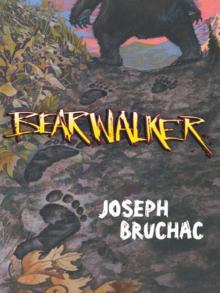 Bearwalker
Bearwalker Skeleton Man
Skeleton Man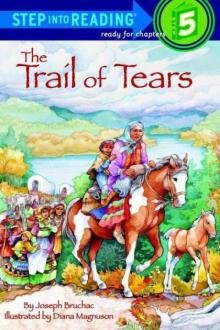 The Trail of Tears
The Trail of Tears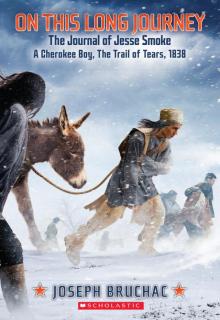 On This Long Journey
On This Long Journey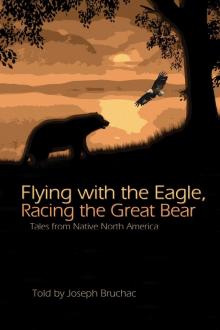 Flying with the Eagle, Racing the Great Bear
Flying with the Eagle, Racing the Great Bear